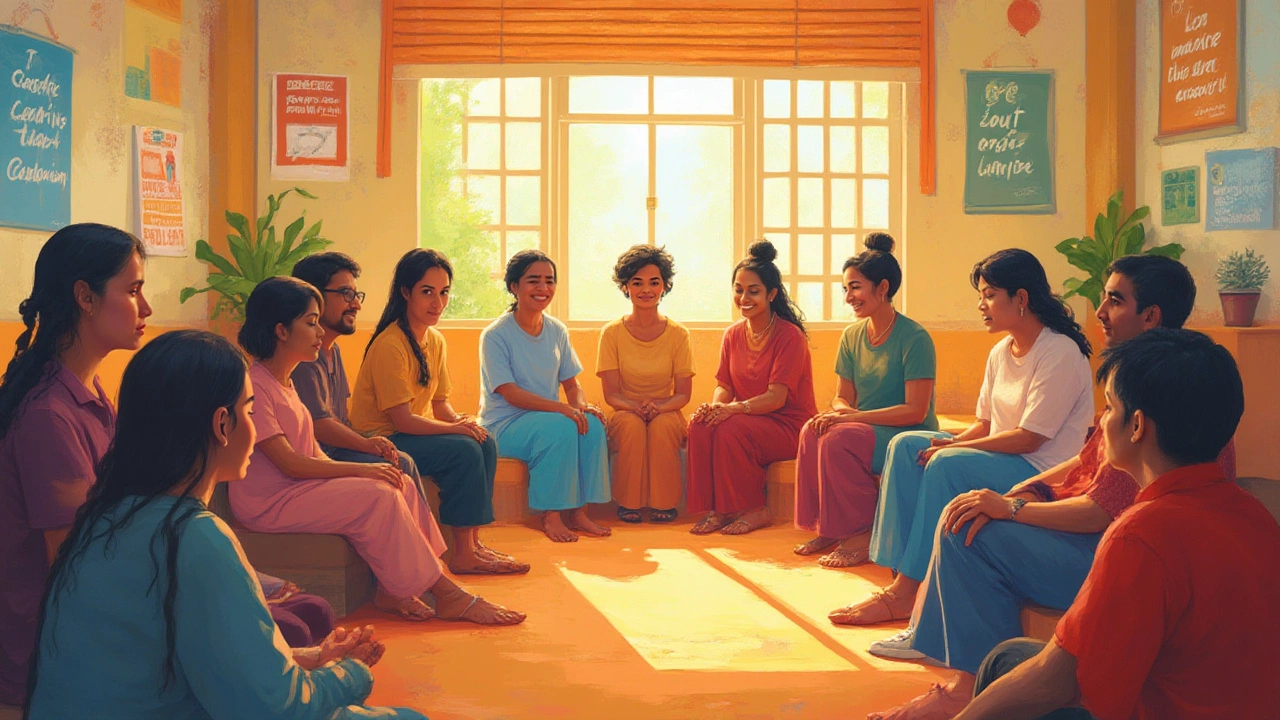Understanding Local Support Groups: Services, Benefits, and Community Impact
 Jul, 17 2025
Jul, 17 2025
No one really brags about joining a support group on a Friday night. But here's something a lot of us miss: local support groups aren't just about sharing sad stories or crying in a circle. In every city—big or small—support groups quietly stitch people’s lives back together again. Even if you’ve never set foot in one, chances are someone close to you has. Ever wonder what really happens behind those doors? It’s not just tea, cookies, or a sympathetic nod. There's so much more under the surface.
The Heart of Support Groups: More Than Just Crisis Helplines
It’s a common mix-up—people often think support groups are for emergencies only, like wildfire hotlines or a last resort for folks at breaking point. In real life, they're more like an emotional gym. You walk in, talk, listen, recharge, and walk out a little stronger. These groups often focus on specific issues: anxiety, depression, parenting challenges, grief, addiction, or even rare diseases. The themes vary, but the heartbeat is constant: sharing, guidance, and hope.
Take a look at some research from the Mayo Clinic: peer-run support groups often improve coping skills by up to 40% for people with chronic mental health challenges. That’s not the kind of number you see just from venting on social media. The real secret? You get wisdom from the people who’ve been where you are—sometimes they’re further down the same bumpy road.
When I adopted Rufus, my goofy retriever, I didn’t expect post-adoption nerves to hit so hard. Turns out, there’s a local group for “new pet anxiety.” We swapped nightmare stories (my curtains may never recover), but also best care tips and honest advice. It wasn’t clinical. It was people just being real, minus any judgment or pressure to “fix things fast.”
How Local Support Groups Actually Work
A support group isn’t a classroom, and it’s definitely not a therapy session with someone in a lab coat. Groups are usually peer-led. That means the facilitator is just another person with lived experience—someone who gets it, not a distant expert with a clipboard.
- Structure: Meetings might be weekly, monthly, or as needed. Some follow a script (think 12-step programs), while others are more free-flowing—let the conversation lead.
- Confidentiality: It’s a golden rule: what’s shared in the group, stays in the group. There’s freedom to let your guard down.
- Accessibility: Many groups are free, open to drop-ins, and easy to find through libraries, clinics, or even animal shelters (Bella’s a fan of the local “cat parent vent hour”).
- Hybrid Meetings: Since 2020, lots of groups have gone hybrid. If you’re not up for meeting in person, there’s likely a Zoom or WhatsApp version.
- No judgment. If you need to stay silent, that’s fine. If you want to talk for an hour, there’s usually space for that too.
Here’s a handy way to think about it: if you ever had a group chat meltdown about work or family drama, support groups are the in-person cousin—warmer, safer, and with fewer memes (though some places have great snacks!).

Types of Local Support Groups and Who Joins Them
Support groups are as varied as playlists on Spotify. Some focus on chronic illness (think diabetes or cancer), others on recovery from addiction, or parenting tricky teens. There are also niche communities—grief groups for pet loss, or new immigrant support circles in just about every decent-sized city. Age, background, or job title don’t really matter—stress and struggle are pretty universal truths.
Let’s look at a few real categories:
- Mental health: For depression, anxiety, bipolar disorder, postpartum mood swings. These often work alongside therapy or medical support.
- Substance recovery: Alcoholics Anonymous, Narcotics Anonymous, SMART Recovery for different styles or beliefs.
- Caregivers: Taking care of an aging parent or partner is brutal. Support groups for caregivers offer sanity-saving strategies and emotional venting space.
- Parenting: Single parents, parents of kids with autism, adoptive and foster families—there’s a group for nearly every parenting curveball.
- Special Interest: Pet loss, LGBTQ+ journeys, multicultural adjustment groups, or even support networks for artists hit with creative burnout.
Don’t buy the myth that people in support groups are “weak” or can’t handle life’s challenges. A study in the Journal of Consulting and Clinical Psychology notes that group participants often report higher long-term resilience and better life satisfaction than those who go it alone. I’ve seen it in my own circles—people who show up, share, and listen often find fresh courage to tackle problems that seemed unbeatable alone.
The Hidden Benefits No One Talks About
Sure, the first benefit is obvious: support. But what’s not obvious until you’ve been there? How much these groups can change your day-to-day—it’s not just about surviving hard times.
- Real-world strategies: It’s one thing to read an advice column online; it’s another to get honest, unfiltered hacks from someone with the same problem. When Bella had a health scare, my local cat parent group shared tips that weren’t in any pamphlet from the vet.
- Community connection: These circles often break down the walls of isolation. I’ve seen neighbors become friends, and casual acquaintances loop each other in for everything from ride-sharing to pet-sitting swaps.
- Reduced stigma: Stigma is one tough beast. But it’s easier to shake off the feeling of being “weird” or “different” when people around you share the same battles. There’s a kind of freedom in being honest, no sugar-coating needed.
- Continued accountability: Having people checking in keeps you on your goals, whether it’s quitting smoking, walking more, or getting through the first year after a tough loss. Regular meetings create a gentle sense of “we’re in this together,” so you’re less likely to fall through the cracks.
Want to see some real numbers? Take a look at this data on mental health support group outcomes:
| Group Type | Reported Increase in Coping Skills | Reported Drop in Isolation | Improvement in Mood |
|---|---|---|---|
| Mental Health Peer Support | 42% | 58% | 47% |
| Caregiver Groups | 29% | 63% | 34% |
| Grief Groups | 31% | 51% | 37% |
Numbers aren’t cold here—they mean people are actually feeling better, holding on, and sometimes even thriving after hard blows.

Tips for Finding—and Getting the Most Out of—a Support Group
If you’re thinking about joining a support group, the step can feel weirdly huge, especially if you’re used to white-knuckling life solo. Here are some tried-and-true tips, picked up from both experience and real group facilitators I’ve chatted with over the years:
- Start with a goal: Are you desperate for advice, looking for friendship, or just needing not to feel so alone? Pick a group that matches your biggest need first.
- Check logistics: Is it in-person or online? Morning or evening? Some groups vibe more relaxed, others are structured—with shared check-ins or readings.
- Test-drive a few: You’re not marrying the first group you join! Try more than one if the first isn’t a fit.
- Stay consistent: The more regularly you show up, the easier it feels. Even if you barely say a word at first, just being present helps.
- Remember confidentiality: Trust takes time. Anything shared, from work trouble to addiction slips, stays off social media or text threads. Respect for privacy lets everyone be open.
If you’re shy, try reaching out to the group leader in advance. You don’t have to share your whole history on the first day. Sometimes the best thing is to just listen and get a feel for the room—or screen—before you jump in. And if accessibility is an issue? Many local libraries and community centers keep an updated list of local support options, and many organizations have resources for the hearing or visually impaired as well.Local support groups are one of those hidden gems most folks ignore till they need them. The truth? They work because they turn problems into connection. You walk in feeling like the only one with a weird struggle. You walk out realizing half the room has been there, failed, tried again—and survived. It’s not magic, and there’s nothing fancy about it. But if you ask anyone who’s stuck around, they’ll tell you: it can be exactly what holds things together when life is unraveling.